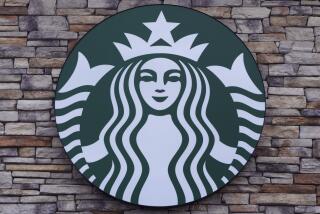Diedrich Chairman Steps Down After $1.14-Million Loss
- Share via
IRVINE — Burned by its rapid expansion, Diedrich Coffee Inc. reported a $1.14-million fiscal fourth-quarter loss, and announced that Martin Diedrich is stepping down as chairman.
The company, riding the wave of coffeehouse popularity, zoomed from 12 stores to 47 in the last year as it continued its expansion beyond its Orange County roots into Colorado and Texas. But, acknowledging that sales in those “non-core” markets were below expectations, the company said it would close 12 poorly performing outlets and take a $4.5-million charge against earnings in its fiscal first quarter of next year.
Diedrich, 37, whose father opened the family’s first java joint in Costa Mesa in 1972, will remain with the company, carrying the unusual title of chief coffee officer, as well as that of vice chairman.
He is replaced as chairman by interim chief executive officer Lawrence Goelman, a company director who joined management just last month after the resignation of Steven A. Lupinacci as chief executive.
Goelman insisted that the company’s prospects for growth remain bright. “We think the concept’s ability to travel is excellent,” he said.
The loss resulted from slow sales at stores in poor locations, an infrastructure that was taxed by the quick expansion, and lower-than-expected sales from a holiday catalog, he said. Goelman wouldn’t disclose which stores were slated for closure, but he indicated that some would be in the Denver area.
The company will now focus its expansion on opening kiosks and carts in malls and other high-traffic locations, he said. Diedrich will also seek retail partners interested in luring customers into their stores with coffee bars, Goelman said.
Diedrich, displaying its willingness to try untested concepts, in February announced plans to open coffeehouses in Home Savings branches. Goelman said the company will continue with that plan.
The retrenchment, though not unexpected, is undoubtedly a bitter brew for the chain to swallow. Until the last few years, Diedrich had remained a small, local presence. Three years ago, it spurned a buyer for fear of growing too fast.
But it moved into Denver and Houston through the acquisition of smaller chains. And after raising about $21 million in its initial public stock offering in September 1996, the company jumped on the fast track. As recently as last November, it said it planned to add 30 more stores in 1997.
The company’s loss in the fiscal fourth quarter ended Jan. 29 came despite a 53% sales jump to $5.77 million. A year earlier, Diedrich earned $44,617 on net sales of $3.76 million.
For the year, Diedrich lost $985,705, contrasted with net income of $185,644 in the previous fiscal year, while its annual sales nearly doubled to $19.8 million from $10.2 million.
The company’s stock closed Tuesday at $2.625 a share, down 25 cents in Nasdaq trading, and well below its high of $12 shortly after the initial public offering.
Despite relinquishing the helm, Diedrich said he was “optimistic and excited about the future prospects” of the company. In his new role, he will oversee the buying and roasting of beans. “Given Martin’s family history, we thought that would be an appropriate position,” Goelman said.
Goelman said he will remain as chairman, but the company is continuing its search for a permanent chief executive.
As part of the management shake-up, Kerry Coin is being promoted from executive vice president to president.
*
Ironically, Diedrich’s troubles aren’t related to the surge in coffee prices that has battered the stocks of other coffeehouse operators recently. Coin said the company guards against price fluctuations by timing its bean buying to avoid peaks.
Instead, analysts see Diedrich’s woes as a case of growing quickly and losing control. “It happens all the time, unfortunately,” in the restaurant and specialty food chain business, said Rancho Palos Verdes-based consultant Janet Lowder.
Lowder cited the rise and fall of the yogurt shop as another example. Now, the same misfortunes are befalling bagel merchants, which are in the midst of a consolidation. “They go through rapid expansion, then retrench,” she said.
Public companies like Diedrich are under intense pressure to satisfy Wall Street’s taste for growth, she said. Trouble is, she said, the coffeehouse industry might be approaching the point of saturation.
Michael T. Moe, an analyst at Montgomery Securities in San Francisco, said that Diedrich’s missteps are the kind frequently seen when a small, thriving chain moves away from its home turf and finds the expansion far more complicated than anticipated. So far, he said, the only coffeehouse chain that has succeeded on a national level is Starbucks, which has become such a powerhouse that smaller rivals now have a tough time competing.
For Diedrich, moving into Denver “was a very risky business, and unfortunately, it’s come back and bit them.”
*
Analysts aren’t counting Diedrich out, however. The company is still well regarded for its quality, Moe said, and some of its units produce solid financial results.
Randall Hiatt, an Irvine restaurant consultant, said that Diedrich still has a unique identity that sets it apart from Starbucks and other chains.
Preferring suburban neighborhoods to busy downtown sites, Diedrich tries to entice customers with its cozy atmosphere and evening entertainment. “They have a kind of a unique niche that is more of a comfortable, social, stay-and-have-a-cup-of-coffee, rather than the grab-a-cup-and-run experience,” he said.
Expanding into kiosk and cart operations is a good idea, Hiatt said, but not necessarily a slam dunk. Competition for prime sites is fierce, and many airports and malls are already filled to the brim with coffee.
“They are not necessarily easy solutions,” he said.
More to Read
Inside the business of entertainment
The Wide Shot brings you news, analysis and insights on everything from streaming wars to production — and what it all means for the future.
You may occasionally receive promotional content from the Los Angeles Times.











